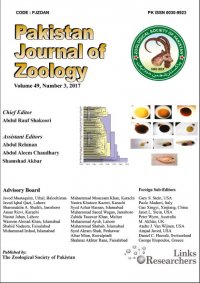Cloning and Expression of Human Interleukin 2 (IL-2) in E. coli and its Antitumor Activity
Cloning and Expression of Human Interleukin 2 (IL-2) in E. coli and its Antitumor Activity
Qurrat ul Ain Shafique1, Sana Batool2, Hanfa Ashfaq2, Asima Tayyab2, Roquyya Gul3 and Mahjabeen Saleem1*
ABSTRACT
Interleukin 2, also known as T cell growth factor, brought a great revolution in the field of immunology. IL-2 is a pleiotropic cytokine and one of the cytokines that is approved by FDA for cancer immunotherapy particularly kidney and skin cancer. Interleukin-2 (IL-2) is a 4-helix-bundle type I cytokine possessing a cytokine receptor chain essential for the immune response. The current study presents a vector/host combination (pET28a(+)/IL-2) and optimization of expression in LB,TB and M9 media with varying concentrations of inducers (IPTG and lactose) and post induction time. Maximum expression of IL-2 was achieved in LB with 0.5 mM IPTG for 6 hours post induction time. A denaturing purification scheme (Immobilized metal affinity chromatography) was employed for the purification of IL-2. The refolding of the purified IL-2 was achieved by stepwise dialysis method using urea gradient (8M-0M). Human IL-2 was recovered from 1 litre culture to a purity level of ~95%. In vitro cytotoxic potential of IL-2 on HepG-2 and MCF-7 cell lines revealed that it possess sufficient cytotoxic potential and can inhibit the growth of these cell lines directly. Thus, refolded IL-2 had activity identical to that of authentic IL-2 and enhanced the anti-tumor activity of HepG-2 as compared to MCF-7 cells. These conclusions suggest the potential use of the refolded cytokine as immunotherapeutic agent for treatment of hepatocellular carcinoma.
To share on other social networks, click on any share button. What are these?










